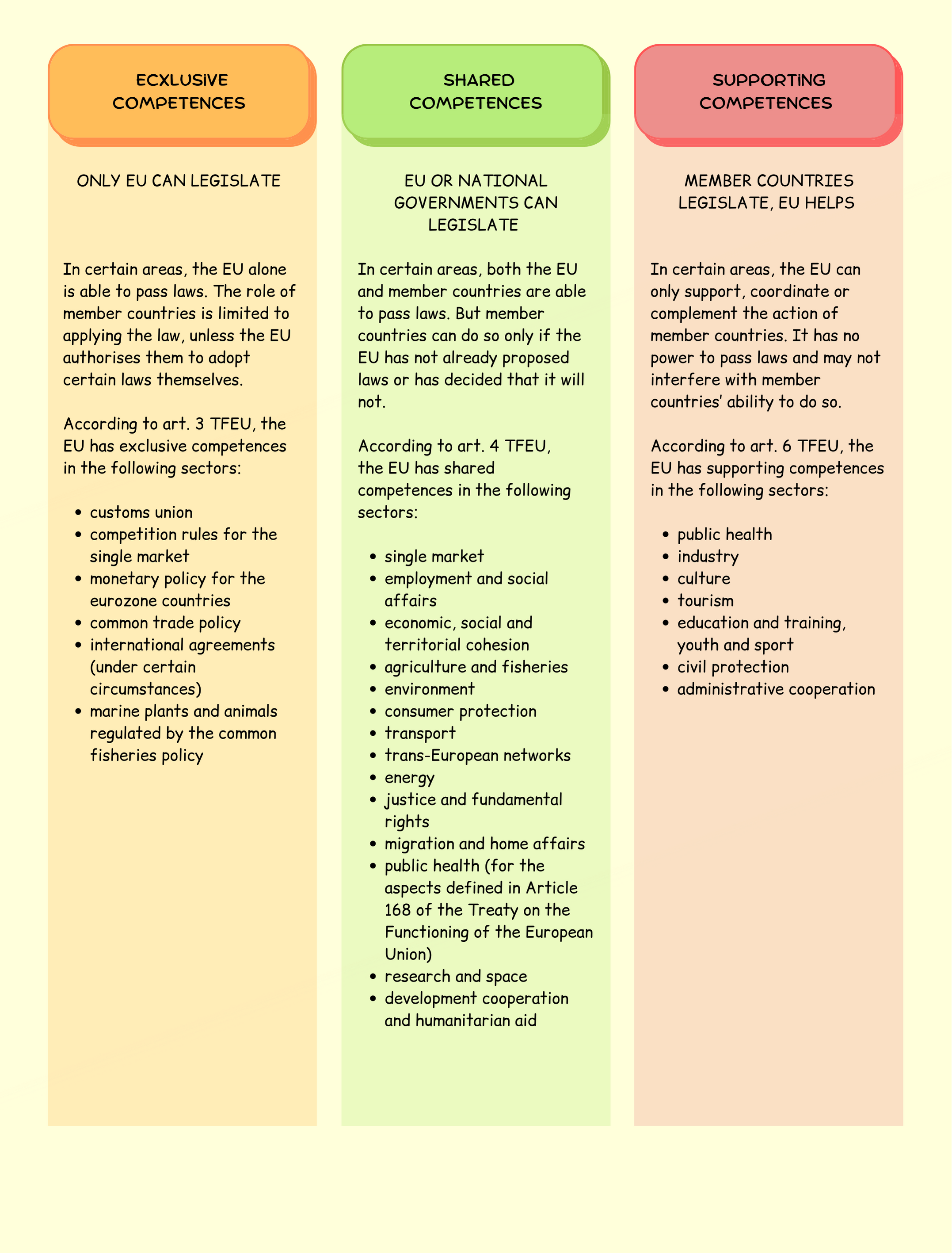European institutions and the EU anti-discrimination policy
3. The division of competences between the EU and the member countries
To approach European policies and understand the role of the European Parliament, we must start from the fact that the European Union can only act within the limits of the powers that the member countries have conferred on it to achieve the common objectives defined in the treaties.
Article 5 of the Treaty on European Union (TEU): “The limits of Union competences are governed by the principle of conferral. (...) Under the principle of conferral, the Union shall act only within the limits of the competences conferred upon it by the Member States in the Treaties to attain the objectives set out therein. Competences not conferred upon the Union in the Treaties remain with the Member States”.

Source: Areas of EU action, European Commission
This video briefly presents the powers of the EU:
SPECIAL COMPETENCES
In addition to the competences described above, the Union can take measures to ensure that EU countries coordinate their economic, social, and employment policies at EU level.
In the framework of EU economic governance, for example, in 2010 the European Semester was established, a coordination period (from January to June of each year) during which member countries develop their own economic, budgetary, and employment policies in line with the indications and standards provided by the EU. Initially introduced as a coordination tool at the level of economic and budgetary policies, the European Pillar of Social Rights has been integrated in the European Semester since 2017, and later with the adoption of the European Green Deal in 2019, the sustainable development goals of United Nations 2030 Agenda. In 2020 and 2021 the European Semester underwent some temporary changes to make space for the preparation, adoption, and implementation of the Recovery and Resilience Facility introduced to face the Covid-19 pandemic.
In the sectors in which the EU does not have legislative powers but only supportive powers, because these are those areas in which the States do not want to lose sovereignty and/ or in which the harmonisation of legislation is particularly difficult given the variety of political-institutional contexts, the coordination of national policies is also implemented through another instrument, the Open Method of Coordination (OMC): the Member States, while not introducing legally binding common regulations, nevertheless try to coordinate themselves, to set joint objectives, to discuss, share good practices, and monitor each other. This is particularly the case in the fields of employment, social protection, education, youth, and vocational training.
The EU's common foreign and security policy is characterised by specific institutional aspects, such as the limited participation of the European Parliament and the European Commission in the decision-making process and the exclusion of any legislative activity. This policy is defined and implemented by the European Council (made up of the heads of state and government of the EU countries) and by the Council of the European Union (made up of representatives of each EU country at ministerial level). The President of the European Council and the High Representative of the Union for Foreign and Security Policy represent the EU in matters of common foreign and security policy.
USE OF COMPETENCES
The exercise of EU competences is subject to two fundamental principles established in Article 5 of the Treaty on European Union:
principle of subsidiarity : in the area of its non-exclusive competences, the EU can only act if, and to the extent that, the objective of a proposed action cannot be satisfactorily achieved by EU countries, but it could be better achieved at community level;
principle of proportionality: the content and scope of EU action cannot exceed what is necessary for the achievement of the objectives of the treaties.
Article 5 of the TEU:
“The use of Union competences is governed by the principles of subsidiarity and proportionality.(...) Under the principle of subsidiarity, in areas which do not fall within its exclusive competence, the Union shall act only if and in so far as the objectives of the proposed action cannot be sufficiently achieved by the Member States, either at central level or at regional and local level, but can rather, by reason of the scale or effects of the proposed action, be better achieved at Union level. The institutions of the Union shall apply the principle of subsidiarity as laid down in the Protocol on the application of the principles of subsidiarity and proportionality. National Parliaments ensure compliance with the principle of subsidiarity in accordance with the procedure set out in that Protocol.
Under the principle of proportionality, the content and form of Union action shall not exceed what is necessary to achieve the objectives of the Treaties. The institutions of the Union shall apply the principle of proportionality as laid down in the Protocol on the application of the principles of subsidiarity and proportionality".